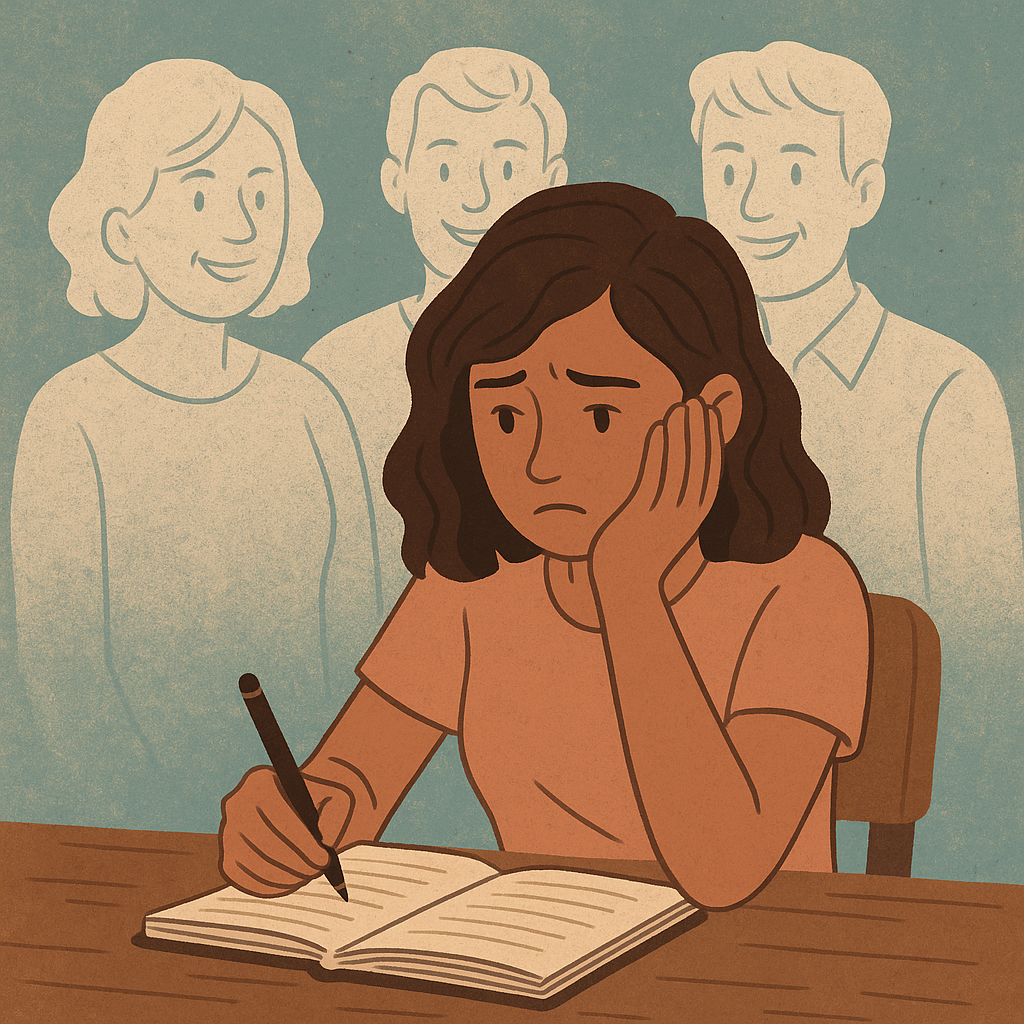30 Journal Prompts for People Pleasers: Stop the Anxiety Cycle
Break free from people-pleasing anxiety. This guide offers 30 deep journaling prompts to help you understand your triggers, set healthier boundaries, and build real self-respect from the inside out.

📌 TL;DR — Prompts for People Pleasing
People pleasing creates anxiety because you're constantly monitoring others' reactions. Key prompts: "What do I actually want here?" "Am I saying yes to avoid conflict?" "What would I do if I wasn't worried about their reaction?" The goal: learn to distinguish your genuine desires from automatic people-pleasing responses.
If you’re the “reliable one,” the “nice one,” the one everyone goes to because you’ll always say yes…
you’ve probably noticed something:
Your nervous system is exhausted.
You lie awake replaying conversations.
You say yes while your body is screaming no.
You feel anxious before you disappoint anyone — sometimes even before you consider disappointing them.
This is people-pleasing–induced anxiety.
This article gives you 30 deep journaling prompts for mental health specifically for that pattern — not generic “gratitude” questions, but prompts designed to:
- Turn anxiety from “enemy” into signal
- Separate love from self-abandonment
- Help you build boundaries without becoming cold or selfish
- Train your mental health like a muscle, not a fragile crystal
Read through once. Then pick a handful of prompts that hit a nerve and start there.
1. First, Reframe Anxiety: Signal, Not Defect
If you treat anxiety like a glitch, you’ll spend your life trying to mute it.
If you treat anxiety like a signal, you can use it.
Anxiety isn’t proof there’s something wrong with you. It’s proof your system is trying to protect you — sometimes clumsily, sometimes too aggressively, but always with the intention of keeping you safe.
Instead of “What’s wrong with me?” the better question is:
“What is this anxious feeling trying to tell me?”
The twist is language. When you say, “I am anxious,” you fuse your identity with a passing state. When you say, “I feel anxious because…,” you place the emotion back where it belongs: as an experience, not a definition.
Journaling Prompts: Honoring Anxiety as a Signal
1. Complete this sentence 5 times without overthinking: “I feel anxious because…”
Write fast. Don’t tidy it up. Let your nervous system speak before your ego edits.
2. Looking at what you wrote, what might my anxiety be trying to protect me from?
Overcommitment? Rejection? Conflict? Being seen as “selfish”? Name the theme.
3. In one current situation, where is my anxiety exaggerating the threat?
Write the “catastrophe” version. Then write the most realistic version. Notice the gap.
4. If my anxiety could speak clearly in one sentence today, what would it say?
Example: “You keep promising things your body can’t deliver.” Or “You’re scared they’ll leave if you stop over-giving.”
5. What would change in my life if I genuinely believed: “Feeling anxious is normal; it does not mean I am broken” ?
Be specific: relationships, work, social life, creativity.
2. People-Pleasing: Self-Abandonment in a Nice Outfit
People-pleasing looks like kindness. On the surface, it is: you care, you support, you show up.
But underneath, something else is going on:
- You absorb other people’s discomfort so they don’t have to feel it.
- You override your own limits so no one ever thinks badly of you.
- You confuse being liked with being loved.
That’s where anxiety comes in.
Your body knows you’re breaking your own boundaries. It protests with tightness in your chest, a pit in your stomach, racing thoughts at 2 a.m. Anxiety is the bill arriving for all the times you spent your energy like it was infinite.
A key distinction here:
- Authentic guilt = “I acted out of alignment with my own values.”
- People-pleasing guilt = “They might be upset with me.”
Only one deserves to run your life.
Journaling Prompts: Seeing the Cost of People-Pleasing
6. Write about a recent “yes” that felt like a “no” in your body.
Where did you feel it — throat, chest, gut? What did you tell yourself to push through?
7. In that situation, what was I more afraid of: betraying my own needs, or disappointing them?
Be uncomfortably honest.
8. Recall a moment when you felt “guilty” for setting a boundary or saying no. Was that guilt coming from my values or from their expectations?
Describe the difference in detail.
9. Finish this sentence: “The cost of my people-pleasing on my mental health has been…”
List everything: burnout, resentment, insomnia, numbness, overthinking, loss of self-respect.
10. If I stopped absorbing other people’s pain for 30 days, what am I afraid would happen? What might realistically happen instead?
Write both fear story and realistic story side by side.
3. Family, Buttons, and the Original Source Code
You don’t invent people-pleasing in your late 20s.
You rehearse it in childhood.
Maybe you grew up with anxious parents, unpredictable moods, unspoken rules like:
- “Don’t upset your father.”
- “Be easy, be helpful.”
- “Don’t be a burden.”
Your nervous system learned:
“If I manage everyone’s feelings, I stay safe and loved.”
That was brilliant survival design for an 8-year-old. It’s just outdated code for a 30-year-old.
No surprise that “home” often feels like the final boss of anxiety. Families are talented at pushing buttons — they installed them.
The goal isn’t to blame your family forever. It’s to update your coping mechanisms and install something new: boundaries.
Boundary ≠ punishment.
Boundary = “I care about this relationship enough to not keep silently resenting you.”
Journaling Prompts: Meeting Your People-Pleasing Origin Story
11. When I’m with my family (or thinking about them), what specific situations spike my anxiety the most?
List 3. Describe what is said, how your body reacts, what role you slip into.
12. As a child, how did I try to keep the peace or stay safe emotionally?
Examples: being the good kid, the quiet one, the fixer, the joker, the invisible one.
13. Imagine 8-year-old me sitting at a chaotic family dinner. What did they learn about love, conflict, and being “good”?
Write from their point of view, not your adult analysis.
14. Draft one boundary sentence for a recurring pattern, like a script I can refine over time.
For example:
“When you criticize my life choices, I feel shut down. I’m happy to talk about my life, but not in a judging way. If it keeps happening, I’ll need to end the conversation.”
Notice what your body does as you write it.
15. What is one tiny, low-stakes boundary I can experiment with this week to protect my mental health?
Think: “I’ll reply to messages tomorrow,” or “I won’t discuss my dating life with relatives,” or “I will not explain every ‘no’ in detail.”
Small reps still count.
4. Mental Health Is a Muscle, Not a Fragile Crystal
The modern mental health narrative often frames your mind as something delicate that must be relentlessly protected:
- Avoid hard people.
- Avoid hard conversations.
- Avoid hard decisions.
There is wisdom in not re-traumatizing yourself. But there’s a trap:
If you rearrange your entire life just to never feel anxious, you don’t heal. You just build a smaller and smaller world.
Think of your mental health like physical strength:
- Rest is crucial.
- Overtraining is harmful.
- But never lifting anything doesn’t keep you safe. It just keeps you weak.
You don’t become less anxious by waiting until you “feel ready.” Confidence, courage, resilience — they all show up after action, not before.
The practice is voluntary discomfort: small, controlled doses of “hard things” that teach your nervous system, “This is scary, but I survived. I can do this.”
Journaling Prompts: Training Your Mental Health
16. Where in my life am I quietly rearranging everything just to avoid feeling anxious?
Examples: never asking for a raise, never saying “I can’t,” never voicing disagreement, always hosting but never saying what you want.
17. Choose one “voluntary discomfort rep” for this week.
Examples: say no once without over-explaining, ask for help once, state a preference, share one honest feeling with someone safe.
Write it down and rate, from 1–10, how scary it feels.
18. After you do it, journal: What actually happened vs what my mind predicted would happen?
This is where the real rewiring happens. Reality is almost never as catastrophic as the story.
19. Recall one hard thing I’ve survived that I almost never give myself credit for.
What strengths did that experience secretly build? Patience? Independence? Grit? Empathy?
20. When I talk to myself before doing something hard, what do I sound like: a drill sergeant or a wise mentor?
Rewrite one “pre-game” script in a kinder, clearer voice that still asks you to show up.
5. Comparison, Timelines, and the Invisible Anxiety of Feeling “Behind”
School gave us a neat, linear world:
Grade 7 → Grade 8 → Grade 9.
Everyone moves together.
Adult life is nothing like that. You open your phone and see:
- 24-year-olds with startups worth more than your parents’ house
- Friends getting married while you’re still figuring out dating
- People announcing dream jobs while you’re just trying not to cry on Monday mornings
Your nervous system quietly absorbs a poisonous story:
“I’m late. I’m failing. Everyone else is ahead.”
That’s an anxiety generator on its own.
But here’s the twist: envy can be useful. Envy often points not to what you should want, but to what you actually care about.
And a lot of “social anxiety” is really wrong-garden anxiety. You’re not broken — you’re just in a room designed for other people’s values.
Journaling Prompts: Untangling Comparison and Belonging
21. Where do I feel most “behind” right now — work, love, money, something else?
Name the specific area, then write whose timeline you’re secretly measuring yourself against (family, culture, Instagram, a friend).
22. Think of a person whose life you quietly envy. What exactly are you jealous of?
The freedom? The depth of relationships? The creative work? This is a clue to what genuinely matters to you.
23. Describe a situation where you felt intensely socially anxious.
Now describe another where you felt completely alive and yourself. What was different? Topics, humor, values, level of depth?
24. Finish this: “If I stopped trying to fit in and only invested in spaces where I truly belong, my social life would look like…”
Paint it: the kind of conversations, the atmosphere, what people care about.
25. What is one practical step I can take in the next month toward “my people” — the right garden for me?
Joining a specific community, class, server, group — anything that increases the probability of belonging instead of performing.
6. Memento Mori: The Anxiety You Avoid Thinking About
There’s a category of anxiety we rarely name out loud:
- Aging.
- Illness.
- Losing people we love.
- Our own death.
Most of us push this to the edges of awareness, then wonder why everything feels so tense and urgent.
Many wisdom traditions have their version of memento mori — remember that you will die — not as a morbid obsession, but as a pressure release:
- Petty comparisons matter less.
- Imagined judgments shrink.
- People-pleasing starts to look absurd.
You remember that your time and energy are finite. Your life is not a dress rehearsal.
Paradoxically, that realization can calm anxiety, because it restores perspective: “I won’t be here forever. How do I want to live while I am?”
Journaling Prompts: Letting Mortality Clarify Your Choices
26. If I deeply remembered that my life is finite, which current anxiety would immediately lose most of its power? Why?
Be blunt. What would stop feeling like an emergency?
27. Write a letter from your 90-year-old self to you now about people-pleasing.
What do they thank you for changing? What do they regret you held onto for too long?
28. Imagine you had 12 months to live in perfect health. Which people-pleasing behaviors would you drop immediately?
Who would you stop trying to impress? What would you finally say? What would you finally stop saying yes to?
29. Describe the kind of inner life — not achievements — that would make you feel at peace on your last day.
More honesty? More presence? More courage? More rest? More creativity? Write it in present tense, as if it’s already true.
30. What is one small action I can take this week that aligns my present life more closely with that “last day” integrity?
Something so small you can’t reasonably avoid it.
7. How to Actually Use These Journaling Prompts (Without Overwhelming Yourself)
You don’t need to tackle all 30 prompts at once. That’s just another way for perfectionism to bully you.
A simple way to approach these journaling prompts for mental health:
- Choose a theme for the week.
- Week 1: “Anxiety as signal” (Prompts 1–5)
- Week 2: “People-pleasing” (6–10)
- Week 3: “Family + origins” (11–15)
- Week 4: “Mental muscle + voluntary discomfort” (16–20)
- Week 5: “Comparison + belonging” (21–25)
- Week 6: “Mortality + meaning” (26–30)
- Give yourself 10–15 minutes per session.
Pick one to three prompts per day. That’s enough. Depth matters more than quantity. - End each session with one experiment.
Ask yourself: “What tiny behavior can I try this week based on what I just wrote?”
Anxiety shifts when your behavior shifts, not just your thoughts. - Expect resistance. Treat it as data, not failure.
On the days you avoid journaling, notice what you’re afraid of seeing. That’s often where the gold is.
Start each session with the same ritual line:
“Today, I feel anxious because…”
Even if you’re not “very” anxious that day. This keeps your journal tied to your real-time inner weather.
8. A Last Word for the Soft, Tired Over-Giver in You
If people-pleasing is making you anxious, it doesn’t mean you’re weak.
It means you’re sensitive. You care. You’ve been carrying more than your share for a long time.
The work now is not to become hard and uncaring.
The work is to stop abandoning yourself in the name of love.
These journaling prompts are not homework; they’re conversations with yourself — conversations most people never have in a lifetime.
Use them to:
- Listen to your anxiety instead of fighting it
- Untangle love from self-sacrifice
- Learn the art of boundaries without losing your heart
- Slowly build a nervous system that can tolerate honesty, conflict, and your own truth
Your anxiety is not here to ruin your life.
It’s here to tell you:
“Something about the way you’re living is too small for who you really are.”
The rest of your life is the answer to that message.
Conclusion: The End of People-Pleasing Is the Beginning of Mental Freedom
People-pleasing anxiety doesn’t start with the world.
It starts with the small ways you’ve been abandoning yourself — quietly, politely, habitually — for years.
Not because you’re weak.
Not because you’re broken.
But because you were trained to survive by being agreeable.
Journaling is your way back to yourself.
Every time you write honestly, without performing, without editing, without trying to be the “good” version of you… you reclaim a piece of your inner authority.
You shift from:
- reacting → choosing
- pleasing → respecting
- avoiding → facing
- suppressing → expressing
- self-abandonment → self-loyalty
This isn’t overnight work.
It’s slow, honest, courageous work — the kind that builds a real backbone, not a brittle façade.
With these 30 prompts, you’re not just doing “mental health exercises.”
You’re learning a new relationship with your own mind.
You’re teaching your nervous system:
“I hear you.
You don’t have to scream anymore.”
And as you do, something beautiful happens:
Your anxiety becomes guidance,
your voice becomes clearer,
your boundaries become natural,
your relationships become more honest,
and your life begins to feel like it actually belongs to you.
This is the quiet revolution of inner work —
not becoming less anxious,
but becoming more you.
And that, truly, is the end of people-pleasing.
FAQ: Journaling Prompts for Mental Health & People-Pleasing Anxiety
1. How does journaling help with people-pleasing–related anxiety?
Journaling breaks the autopilot loop.
People-pleasers often react before they reflect — saying yes too quickly, absorbing tension unconsciously, suppressing resentment until it leaks out as anxiety.
Writing slows the pattern down.
It helps you:
- Notice what triggers your over-giving
- Distinguish authentic care from fear-based compliance
- Hear your anxiety as a signal instead of a self-judgment
- Rebuild a relationship with your own needs
Most people-pleasers don’t even know what they want. Journaling is the first safe place to tell the truth.
2. Why does people-pleasing cause anxiety in the first place?
Because people-pleasing is self-abandonment disguised as kindness.
When you say yes while your body says no:
- You override your boundaries
- You lose trust in yourself
- Your nervous system enters a constant “please don’t be mad at me” mode
Anxiety is your system saying:
“You’re carrying other people’s emotional weight at the expense of your own.”
It’s not weakness. It’s physics.
3. What if journaling makes me more anxious by bringing up painful memories?
That’s normal — and temporary.
When you first stop suppressing your feelings, they tend to rise to the surface. It’s the emotional equivalent of thawing ice.
To make journaling safer:
- Keep sessions to 10–15 minutes
- End with one grounding sentence (“Right now I am safe”)
- Write about the present feeling, not the whole childhood story at once
- Take breaks; depth doesn’t require drowning
Your nervous system learns through small, consistent doses of truth.
4. What’s the best time of day to use journaling for mental health?
There are three great windows:
Morning:
Your mind is uncluttered; anxiety patterns are clearer.
Late afternoon:
Good for reflecting on interpersonal triggers that happened during the day.
Before bed (gentle version):
Not for deep processing — just for releasing tension.
Ask: “What anxiety am I carrying that doesn’t belong in tomorrow?”
Pick the window that doesn’t feel like a fight.
5. How often should I journal if I struggle with people-pleasing anxiety?
Aim for 3–4 sessions per week.
Not daily.
Daily can turn into another perfectionistic rule (“I should journal every day, or I’m failing”).
People-pleasers need less pressure, not more.
Consistency > frequency.
6. Why do I feel selfish when I set boundaries — even when I know I need them?
Because your body learned, long ago, that your safety depended on harmony.
If you grew up in a home where:
- Adults were anxious, stressed, or unpredictable
- You learned to anticipate everyone’s needs
- Conflict was dangerous
Your nervous system equates boundaries with rejection.
Boundaries feel selfish not because they are —
but because they’re unfamiliar.
And unfamiliar feels like danger, until you practice.
7. What if journaling reveals that I’m angry or resentful? What do I do with that?
Celebrate it.
People-pleasers bury anger so deeply they forget they have a pulse.
Anger is not cruelty — anger is information.
It tells you:
- A boundary was crossed
- A need went unmet
- A value was violated
You don’t have to act on the anger immediately.
Just acknowledge it.
Writing it down is already a form of self-respect.
8. How do I stop overthinking what I write?
Use these techniques:
Time limit:
Set a 5-minute timer. Write without stopping.
Ugly handwriting rule:
Tell yourself: “This is not a novel. This is emotional first aid.”
No rereading rule:
Write today. Read next week.
Sentence stem anchor:
Start with: “Right now, I feel…”
Then let the truth follow.
The goal is honesty, not eloquence.
9. Will journaling automatically make me less anxious with people?
Not by itself — journaling is the first half of the work.
The full loop is:
- Awareness (journaling)
- Experiment (one small behavioral change)
- Reflection (journal again afterward)
This is how the brain rewires:
Insight → Action → Reinforcement.
If all you do is journal, you’ll understand your patterns but stay stuck in them.
10. What if my anxiety comes from family members who don’t respect boundaries?
Then your journal becomes your strategy room.
Ask:
- “What do they say that triggers me?”
- “What role do I slip into around them — the good kid, the fixer, the quiet one?”
- “What is one boundary that protects me without burning bridges?”
- “What is one exit strategy when conversations go sideways?”
Family is the “final boss” because they installed your buttons.
Your journal helps you rewrite the code.
11. Are journaling prompts enough, or do I also need therapy?
Journaling is a powerful self-awareness tool — but it’s not a replacement for professional support.
Seek therapy if:
- Your anxiety interferes with daily functioning
- You constantly fear disappointing everyone
- You can’t set boundaries without panic
- You’re caught in cycles of emotional burnout
- Your childhood patterns feel overwhelming to face alone
Think of therapy as mentorship for your mental health — a wise companion guiding your inner work.
12. Why do journaling prompts specifically help with people-pleasing?
Because people-pleasers rarely slow down enough to ask themselves:
- “What do I want?”
- “What do I feel?”
- “What is my truth here?”
Prompts force you to pause and hear yourself, not the imaginary committee of people in your head.
Every prompt is a subtle act of reclaiming your inner authority.
13. How do I know if my journaling is ‘working’?
Look for small signs:
- Saying “Let me think about it” instead of automatic yes
- Not explaining yourself in paragraphs
- Feeling less responsible for other people’s emotions
- Recovering faster after uncomfortable interactions
- Not rehearsing conversations in your mind for hours
- Feeling a clearer sense of self-respect
Journaling doesn’t always feel good.
But it always reveals something.
14. What if someone gets upset when I change my people-pleasing habits?
They probably will.
People who benefit from your lack of boundaries rarely celebrate your growth.
This doesn’t mean you’re wrong.
It means you’re recalibrating the relationship.
Your journal can help you navigate:
- What you want to say
- What you want to allow
- What you will no longer participate in
- How to stay grounded when others react
Growth often disrupts the old agreements. That’s part of the work.
15. Can journaling really make me more confident?
Yes — because confidence isn’t a mood.
It’s the accumulation of:
- small honest thoughts
- small honest choices
- small moments of self-respect
Journaling shows you your patterns.
Aligned action shows you your strength.
Confidence arrives afterward — as evidence.
Explore More


📚 Part of our Mental Health Journaling Series
Explore our complete guide: 50+ Journaling Prompts for Mental Health — covering anxiety, depression, self-esteem, and more.




